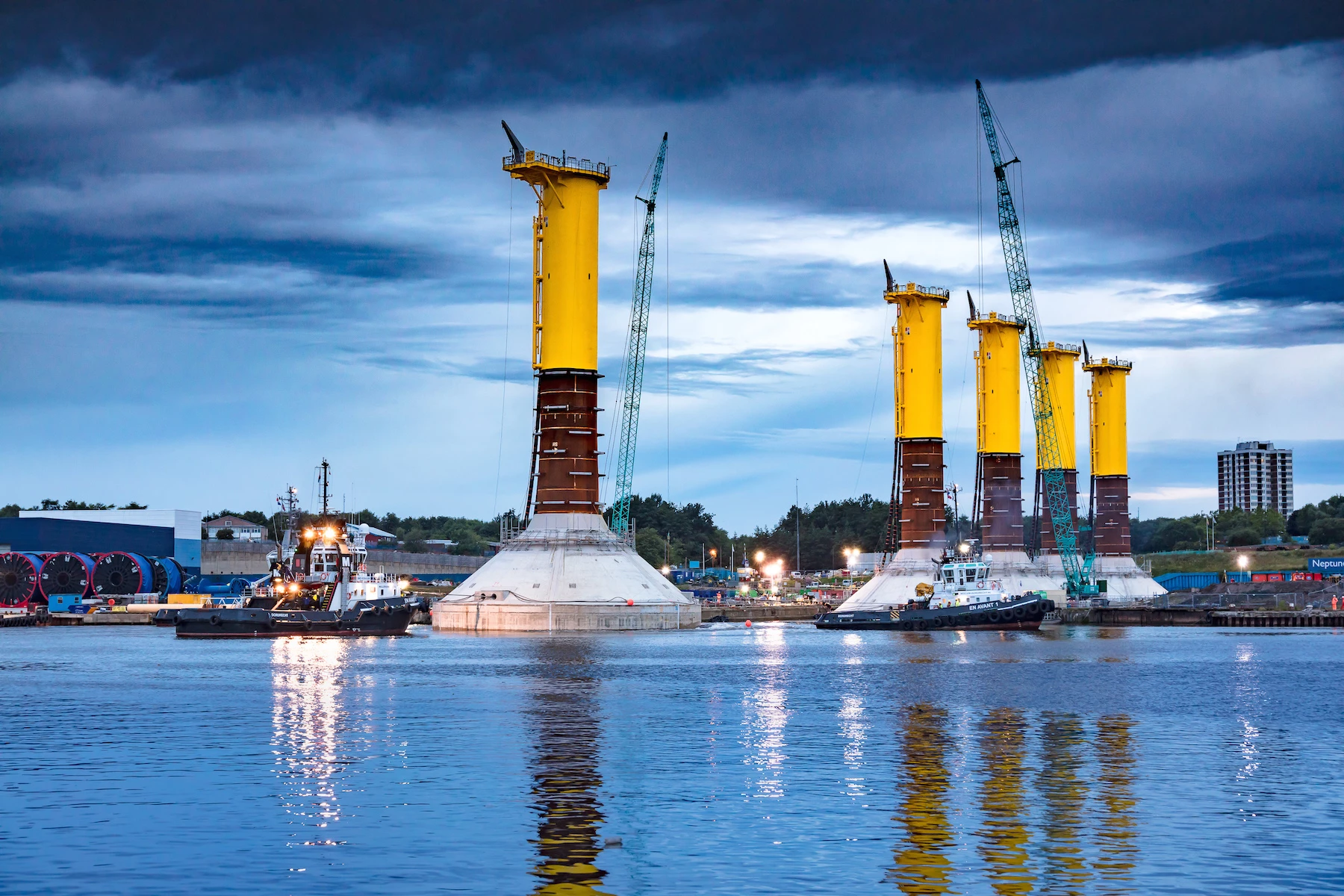
Member Article
‘Ground-breaking’ Blyth offshore wind farm project fast-becoming a reality
The first turbine foundation of an eagerly-anticipated wind farm development off the coast of Blyth is making its journey up the River Tyne, a notable milestone for the project.
EDF Energy Renewables is currently building the Blyth Offshore Demonstrator Wind Farm after taking over responsibility for the scheme from Narec (now ORE Catapult) in October 2014.
The project will see five wind turbines with a total generating capacity of 41.5MW installed around 6.5km off the coast of Blyth. Once operational, they will generate enough low carbon electricity to power around 34,000 homes.*
Concrete gravity based foundations (GBFs) form part of the project and are being installed using a new “float and submerge” method – the first time this method has been used for offshore wind turbines. Designed and built by Royal BAM Group in the Neptune dry dock on the Tyne, the GBFs are being floated into position at sea and submerged onto the seabed to provide the support structures that act as the foundations for the installation of the wind turbines.
Each GBF is made up of more than 1,800m3 of concrete and weighs over 15,000 tonnes when fully installed on the seabed. The structures have a total height of around 60 metres from the base to the access platform.
The GBFs have been constructed at the Neptune dry dock over the past 12 months by BAM Nuttall and these structures will be floated down the river to the Port of Tyne, where extra ballast will be added ahead of their ‘tow-out’ to the offshore wind farm site.
Once the GBFs are put into position over the summer, specialist contractor VBMS will start laying the inter array cables that will connect the individual wind turbines.
Installation of five MHI Vestas V164 turbines will then commence once the cable is securely buried on the sea bed. The turbines will have a power rating of 8.3MW – the largest to be used on an offshore wind farm. It is anticipated that the turbines will start generating power by the end of the year.
EDF Energy Renewables CEO, Matthieu Hue said: “This is the first major offshore operation on this project and over the coming months people will be able to see the wind farm being built out at sea. This ground-breaking scheme will benefit the North East of England and help the UK to meet its future low carbon electricity needs.
“This is the first time that this float and submerge method has been used on a wind farm project. The GBFs are held in place by gravity and this unique design reduces the need to use expensive marine equipment for the installation on the sea bed.”
Divisional Director at BAM Nuttall Scotland and the North of England, Gareth Farrier said, “Bam Nuttall and the wider BAM group are delighted to be supporting EDF Energy Renewables on this demonstrator project, through both the opportunity to deliver innovation and engineering excellence in overcoming the many design and construction challenges, and by continuing our long tradition of civil engineering that has many positive impacts upon the lives of the people in the North-East.”
Looking to promote your product/service to SME businesses in your region? Find out how Bdaily can help →
Enjoy the read? Get Bdaily delivered.
Sign up to receive our daily bulletin, sent to your inbox, for free.




 test article 123456789
test article 123456789
 hmcmh89cg45mh98-cg45hm89-
hmcmh89cg45mh98-cg45hm89-
 test456456456456456456
test456456456456456456
 test123123123123123123
test123123123123123123
 test xxxdiosphfjpodskhfiuodsh
test xxxdiosphfjpodskhfiuodsh
 Savour the flavour: North Tyneside Restaurant Week returns for 2024
Savour the flavour: North Tyneside Restaurant Week returns for 2024
 Six steps to finding the right buyer for your business
Six steps to finding the right buyer for your business
 Stephen signs off on a special night
Stephen signs off on a special night
 Life’s a Peachaus: Gillian Ridley Whittle
Life’s a Peachaus: Gillian Ridley Whittle
 Making a splash: Phil Groom
Making a splash: Phil Groom
 Making workplace wellbeing a priority
Making workplace wellbeing a priority
 A record of delivery, a promise of more: Ben Houchen
A record of delivery, a promise of more: Ben Houchen